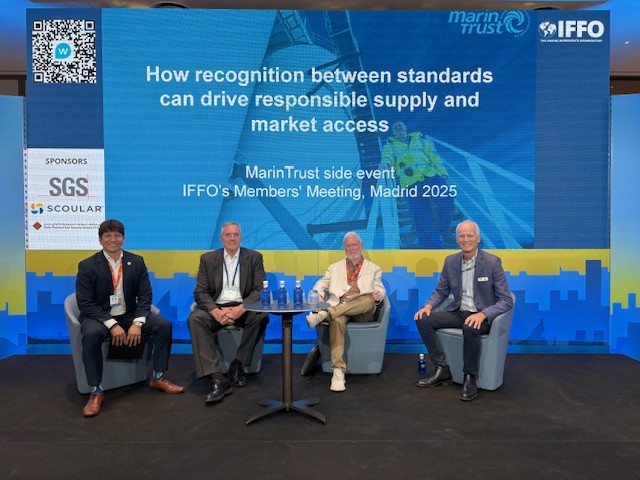In an event held on the sidelines of IFFO’s members meeting in Madrid on the 13th May 2025, MarinTrust explored how seafood certification programmes are working together to increase certified ingredients volumes into aquaculture, with a strong focus on US markets. Speakers showed how recognition between standards can increase efficiency, market access and provide assurance to the value chain. This event brought together Francisco Aldon, CEO, MarinTrust, Mike Kraft, Executive Director, Certified Seafood International (CSI), Dan James, President & CEO, Kodiak Fishmeal Company and Dan Lee, Programme Integrity Advisor, Global Seafood Alliance.

“Forty five percent of marine ingredients globally are certified against MarinTrust” Francisco Aldon noted in his introduction. “The market has increasing demands when it comes to demonstrating responsible practices. Not everyone realises how much effort it takes to track a product from its origins and back to its final destination”. Based on product segregation requested by MarinTrust, certified marine ingredients can be affected by non-certified materials and lose their certification, when mixed with non-certified materials.
Allowing a plurality of choice for marine ingredients and seafood users
The CSI Certification Programme delivers a new third-party certification programme with global reach, and chain of custody with the ability to identify harvest origin on the eco-label. Benchmarked by the Global Sustainable Seafood Initiative (GSSI), CSI certifies some of the most iconic fisheries in the world: Alaska, Pacific Whiting, Iceland, Japan.
“By having the certificates and standards of the GSSI-backed Responsible Fisheries Management (RFM) programme join CSI in April 2025, we wanted to offer more global choice for certification, based on the FAO Code of Conduct for Responsible Fisheries. Fisheries within the CSI framework are mostly in the USA but we have commitments from New Zealand and some projects are underway in South Africa, Canada, Denmark and Norway” Mike Kraft explained.
He noted that it is rare now to find companies who do not have responsible sourcing policies but there is a need for more choice and options to be given to the market. “GSSI is simplifying things by benchmarking the system. It created a pool of acceptable candidates when you need to build a responsible sourcing policy. It is a very rigorous process. There should be great confidence in the system” he added.
Global Seafood Alliance (GSA) is an international membership organisation dedicated to advancing responsible seafood practices through education, advocacy and third-party assurances. Its Best Aquaculture Practices is a third-party aquaculture certification programme that encompasses the entire production chain, including the processing plant, farm, hatchery and feed mill.
As demand for seafood grows, little expansion is seen in wild caught production. While aquaculture grows, so does the feed sector: all contributors are expected to produce responsible products. “We believe in a plurality of options. GSSI and its recognised schemes such as CSI offer more choice for the fishery and the marine ingredients sector and the purchasers of feed ingredients. The market doesn’t want production for the sake of it but wants production accompanied by clear assurances” Dan Lee stated.
Reducing complexity
GSSI provides a rigorous set of requirements, covering both the wild and aquaculture. “Recognition of other standards and benchmark tools by MarinTrust brings benefits to Best Aquaculture Practices - BAP’s certificate holders and GSA’s members. To reduce complexity, we need to send consistent messages through to the customers and this approach can be copied by producers of other ingredients that are key to aquafeeds” Dan Lee continued. “Marine ingredients have done a great job through MarinTrust in terms of providing assurances on responsible sourcing and production. The picture is improving but there are lessons to be learnt by plants producers. Certified soybean meal is well under the 45% which MarinTrust can claim for marine ingredients”.
There is still work to be done in the marine ingredients sector. To move forward and support the development of multispecies fisheries in a responsible way, the MarinTrust Improver Programme is instrumental. Dan Lee also noted that there has been a massive improvement in the production of fishmeal and fish il from by-products: “these raw materials help the aquaculture sector enormously”.
A diversity of market drivers
Kodiak Fishmeal produces fish meal and fish oil from various species and serves customers in the United States. It uses certified raw materials such as MSC and has been MarinTrust certified since 2011, with products sold to Asia and North America.
“The US customers are looking for products from sustainable species and using natural antioxidants. Most of the US customers are pet food and aquaculture products customers” he indicated, noting that petfood is more prevalent for Kodiak than aquaculture. “There is no aquaculture in Alaska, everything is wild caught”.
“It is important that we act as a bridge between fisheries and aquaculture”, Francisco Aldon concluded. A certification programme is expected to be practical, robust and fit for purpose.
